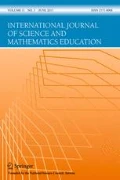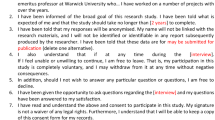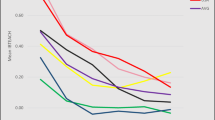Abstract
The conceptual knowledge of science processes possessed by University of Botswana science students and senior secondary school science teachers was sought through a three-part questionnaire. One part requested demographic data of subjects, the second part asked them to select their level of familiarity with the processes, and the third part probed their conceptual definitions of the science processes. The definitions were scored as incorrect, partially correct and correct on an ordinal scale. Statistical analysis was done using Spearman rho correlation and one sample t test. The findings revealed that the science teachers did not have sufficient conceptual knowledge of science processes to help their students to understand in a meaningful way; both students’ and teachers’ views of their familiarity of science processes did not corroborate their demonstrated ability to provide acceptable conceptual definitions of the processes; there was no association between students’ and teachers’ conceptions of the science processes; and if conceptual knowledge of science processes was demanded, the entering students, who were the immediate graduates of the senior secondary schools, might not have enough to pursue tertiary level science courses. It is suggested that both conceptual and operational knowledge of science processes be required at secondary and tertiary levels of science education.
Similar content being viewed by others
References
Archambault, S. (2000). One-Sample T Test. Retrieved on 13 June 2008 from http://www.wellesley.edu/Psychology/Psych205/onettest.html.
Best, J.W. (1977). Research in Education, 3rd Edition. Englewood Cliffs: Prentice-Hall, Inc.
Brown, J.S., Collins, A. & Duguid, P. (1989). Situated cognition and the culture of learning. Educational Researcher, 18(1), 32–41.
Bryce, T.G.K. & Robertson, I.J. (1985). What can they do? A review of practical assessment in science. Studies in Science Education, 12, 1–24.
Campbell, B., Lubben, F., Buffer, B. & Allie, S. (2005). Teaching Scientific measurement at the university: understanding student’s ideas and laboratory curriculum reform. Monograph endorsed by the African Journal of Research in Mathematics, Science and Technology Education.
Edelson, D.C. (1998). Realising authentic science learning through the adaptation of scientific practice. In B.J. Fraser & K.G. Tobin (Eds.), International handbook of science education (pp. 317–331). London: Kluwer Academic Publishers.
Emereole, H.U. (2008). Correlates of conceptual knowledge of science processes with some demographic variables of undergraduate students: the case of University of Botswana. Journal of Baltic Science Education, 7(1), 5–16.
Gaigher, E., Rogan, J.M. & Braun, M.W.H. (2007). Exploring the development of conceptual i = understanding through structured problem-solving in physics. International Journal of Science Education, 29(9), 1089–1110.
Gbamanja, S.P.T. (1991). Modern methods in science education in Africa. Owerri: Totan Publishers Limited.
Holt, Rinehart & Winston (2004). Professional reference for teachers: Process skills. Retrieved on 17 January 2006 from http://go.hrw.com/resources/go_sc/gen/HSTPR009.PDF.
Lazarowitz, R. & Tamir, P. (2000). Research on using laboratory instruction in science. In D.L. Gabel (Ed.), Handbook of research on science teaching and learning:a project of the National Science Teachers Association (pp. 94–128). New York: Macmillan Publishing Company.
Lesh, R. & Clarke, D. (2000). Formulating operational definitions of desired outcomes of instruction in mathematics and science education. In A.E. Kelly & R.A. Lesh (Eds.), Handbook of research design in mathematics and science education (pp. 113–149). London: Lawrence Erlbaum Associates, Publishers.
Lunetta, V.N. (1998). The school science laboratory: Historical perspectives and contexts for contemporary teaching. In B.J. Fraser & K.G. Tobin (Eds.), International handbook of science education (pp. 249–262). London: Kluwer Academic Publishers.
Metz, K.E. (1995). Reassessment of developmental constraints on children’s science instruction. Review of Educational Research, 65, 93–127.
Nussbaum, J. & Novick, S. (1982). Alternative frameworks, conceptual conflict and accommodation: Toward a principled teaching strategy. Instructional Science, 11, 183–200.
Pandilla, M.J. (1990). The science process skills. Research matters — to the science teacher, No.9004. Retrieved on 17 January 2006 from http://www.educ.sfu.ca/narstite/publications/research/skill.htm.
Republic of Botswana (1991). Three-year junior secondary syllabus: science. Gaborone: Ministry of Education.
Republic of Botswana (2000). Botswana general certificate of secondary education teaching syllabus: physics. Gaborone: Ministry of Education.
Republic of Botswana & The University of Cambridge Local Examinations Syndicate (2001). Botswana general certificate of secondary education: assessment of practical skills in science. Gaborone: Ministry of Education.
Roth, W.-M. (1995). Authentic school science: knowing and learning in open-inquiry science laboratory. London: Kluwer Academic Publishers.
Scanlon, E., Morris, E., Di Paolo, T. & Cooper, M. (2002). Contemporary approaches to learning science: technology-mediated practical work. Studies in Science Education, 38, 73–114.
Sere, M.G., Journeaux, R. & Larcher, C. (1993). Learning the statistical analysis of measurement error. International Journal of Science Education, 15(4), 427–438.
Solomon, J. (1980). Teaching children in laboratory. London: Croom Helm.
Standards Department, Ministry of Education, Province of British Columbia (1999). Developing science skills and processes. Retrieved on 17 January 2006 from http://www.bced.gov.bc.ca/irp/science 810/scdeve.htm.
Tomlinson, J., Dyson, P. & Garrat, J. (2001). Student misconceptions of language of error. University Chemistry Education, 5(1), 1–8.
Valentino, C. (2000). Developing science skills. Retrieved on 17 January 2006 from http://www.eduplace.com/science/profdev/articles/valentino2.html.
Watson, R. & Manning, A. (2008). Factors influencing the transformation of new teaching approaches from a programme of professional development to the classroom. International Journal of Science Education, 30(5), 689–709.
White, R.T. (1979). Achievement, mastery, proficiency, competence. Studies in Science Education, 6, 1–22.
Zembylas, M. (2005). Three perspectives on linking the cognitive and emotional in science learning: Conceptual change, socio-constructivism and post-structualism. Studies in Science Education, 41, 91–116.
Author information
Authors and Affiliations
Corresponding author
Rights and permissions
About this article
Cite this article
Emereole, H.U. LEARNERS’ AND TEACHERS’ CONCEPTUAL KNOWLEDGE OF SCIENCE PROCESSES: THE CASE OF BOTSWANA. Int J of Sci and Math Educ 7, 1033–1056 (2009). https://doi.org/10.1007/s10763-008-9137-8
Received:
Accepted:
Published:
Issue Date:
DOI: https://doi.org/10.1007/s10763-008-9137-8




